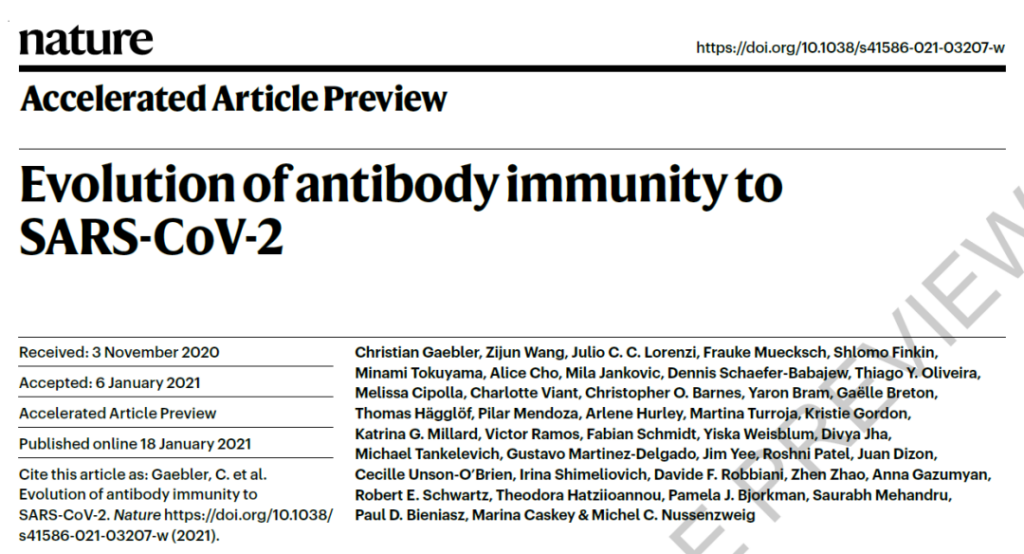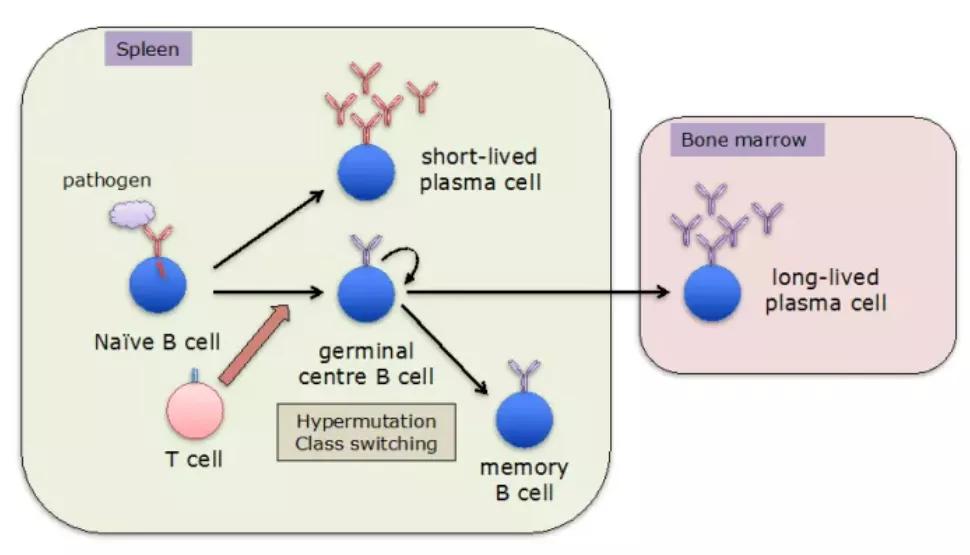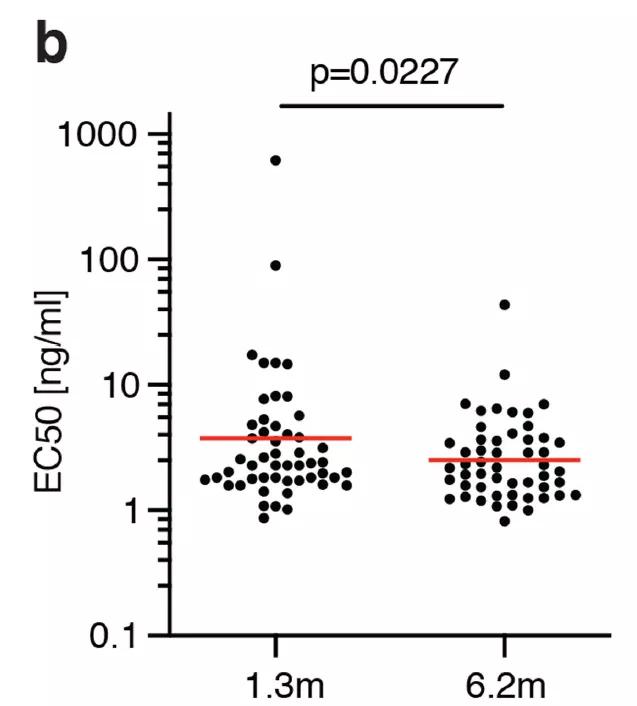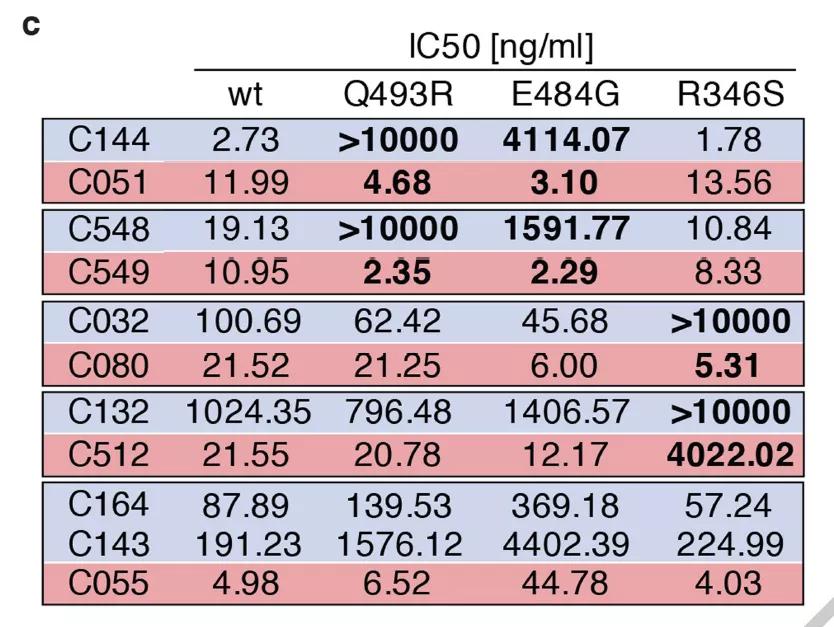Nature: Immune system enhanced with COVID-19 constantly mutating
- Normal Liver Cells Found to Promote Cancer Metastasis to the Liver
- Nearly 80% Complete Remission: Breakthrough in ADC Anti-Tumor Treatment
- Vaccination Against Common Diseases May Prevent Dementia!
- New Alzheimer’s Disease (AD) Diagnosis and Staging Criteria
- Breakthrough in Alzheimer’s Disease: New Nasal Spray Halts Cognitive Decline by Targeting Toxic Protein
- Can the Tap Water at the Paris Olympics be Drunk Directly?
Nature: Immune system enhanced with COVID-19 constantly mutating
Nature: Immune system enhanced with COVID-19 constantly mutating. The mutation of the new coronavirus has become the focus of attention. In the United Kingdom, South Africa, and parts of Brazil, new mutant strains of the new coronavirus have been discovered one after another.
The genetic mutations they carry may not only make the new coronavirus more capable of spreading, but also some genetic mutations can also allow the new coronavirus to evade recognition by the immune system, thereby Make certain neutralizing antibodies ineffective. The emergence of these new coronavirus mutations can’t help but raise people’s doubts, can the body’s immune system provide long-term protection against the new coronavirus?
However, we should not forget that the human body’s immune system is a protective system against pathogen invasion formed by nature’s “threatening”. In the history of its evolution, it has experienced the invasion of hundreds of different pathogens, many of which often produce genetic mutations. The immune system has also evolved a set of mechanisms to respond to virus mutations. A study published today in the form of an “accelerated preview” in the well-known academic journal “Nature” shows that this set of coping mechanisms is still working against the new coronavirus. After the human body is infected by the new coronavirus, it continuously optimizes the antibody immune response to the virus, and generates more diverse and stronger neutralizing antibodies. They can not only neutralize the new coronavirus more effectively, but also have a protective effect on newly emerged mutant strains of the new coronavirus.

In this study, an international research team led by researchers from The Rockefeller University in New York and the Icahn School of Medicine at Mount Sinai evaluated the long-term results of 87 patients infected with the new coronavirus. Antibody immunity was studied. They took samples 1.3 months and 6.2 months after these patients were infected, tested the levels of neutralizing antibodies in their plasma, and analyzed the characteristics of memory B cells.
Similar to some previous studies, the researchers found that in the samples obtained 6.2 months after infection, the titers of neutralizing antibodies against the new coronavirus had dropped by 5 times compared with 1.3 months. However, when the researchers analyzed the characteristics of memory B cells, they found a series of gratifying changes!
If the human immune system’s process of fighting the virus invasion is likened to a war, then the B cells initially activated by the new coronavirus are like “recruits” who have just been recruited into the army. Although they can help eliminate the “enemy army”, it is not clear what the enemy looks like, and the weapons they carry are not sophisticated enough (the specificity of neutralizing antibodies and the ability to bind to antigens are not very strong).
However, in the constant “battle” against the new coronavirus, the immune system will train these “recruits” into “veterans.” They not only firmly remembered the appearance of the COVID-19 virus, but also obtained more sophisticated weapons. A part of “veterans” will stay in the body and become what we call memory B cells. When the virus invades again, they can be quickly activated and produce more effective neutralizing antibodies. It is exactly this phenomenon that researchers have observed in patients infected with the new coronavirus.

First, the analysis of the memory B cell population found that after 6.2 months of infection, the proportion of memory B cells expressing IgG antibodies against the new coronavirus spike protein receptor binding domain (RBD) in the memory B cell population increased significantly. Secondly, the somatic hypermutation (somatic hypermutation) carried in memory B cells is significantly increased. Somatic hypermutation is a way for the immune system to optimize the specificity and antigen-binding ability of neutralizing antibodies by introducing mutations into the genes encoding the variable regions of the antibody heavy and light chains. The increase in somatic hypermutation means that the immune system is still optimizing the antibody immune response to the new coronavirus between 1.3 months and 6.2 months after being infected by the new coronavirus. So, how effective is the training of these immune systems?
The researchers found that among the types of monoclonal antibodies that can be found at 1.3 months and 6.2 months, the ability of monoclonal antibodies to neutralize the new coronavirus at 6.2 months has been significantly enhanced.

In addition, the researchers also tested the effectiveness of neutralizing antibodies on some genetic mutations that can evade recognition by neutralizing antibodies, including the E484K mutation that worries people in the new coronavirus mutants recently discovered in South Africa and Brazil.
The experimental results showed that some of the monoclonal antibodies obtained in 6.2 months can also neutralize the gene mutations that escape the recognition of neutralizing antibodies. The researchers concluded that during the 1.3 months to 6.2 months of evolution, the monoclonal antibodies produced by memory B cells not only have a stronger neutralizing effect, but also have a stronger ability to recognize new coronavirus mutants.

For specific new coronavirus gene mutations, although some monoclonal antibodies obtained at 1.3 months are invalid (for example, IC50>10000 or very high), the antibodies that have evolved further at 6.2 months produce neutralizing efficacy, and the IC50 value is significantly reduced (blue The background is the antibody performance obtained at 1.3 months, and the red background is the antibody performance further evolved at 6.2 months)
For specific new coronavirus gene mutations, although some monoclonal antibodies obtained at 1.3 months are invalid (for example, IC50>10000 or very high), the antibodies that have evolved further at 6.2 months produce neutralizing efficacy, and the IC50 value is significantly reduced (blue The background is the antibody performance obtained at 1.3 months, and the red background is the antibody performance further evolved at 6.2 months)
The continuous evolution of antibodies requires B cells to produce somatic hypermutations and continuous screening of B cells in lymphoid tissues called “germinal centers”. The researchers said that after being infected by the new coronavirus, the new coronavirus antigen can exist on the surface of follicular dendritic cells for a long time in the form of immune complexes, so as to further screen B cells. Another possibility is that although the patient’s symptoms disappeared, there are still some residual viral proteins in the body. Although the levels of these residual viral proteins are very low, they can also be used as antigens to further “train” B cells.
“This is very exciting news.” One of the corresponding authors of the article, Michel C, head of the Laboratory of Molecular Immunology at Rockefeller University. Professor Nussenzweig said, “The type of immune response we have observed may allow the body to produce a rapid and effective immune response when the virus invades again, thereby providing long-term protection.”
Note: This article is intended to introduce medical and health research, not a treatment plan recommendation. If you need guidance on treatment plans, please go to a regular hospital for treatment.
(sourcesina, reference only)
Disclaimer of medicaltrend.org



